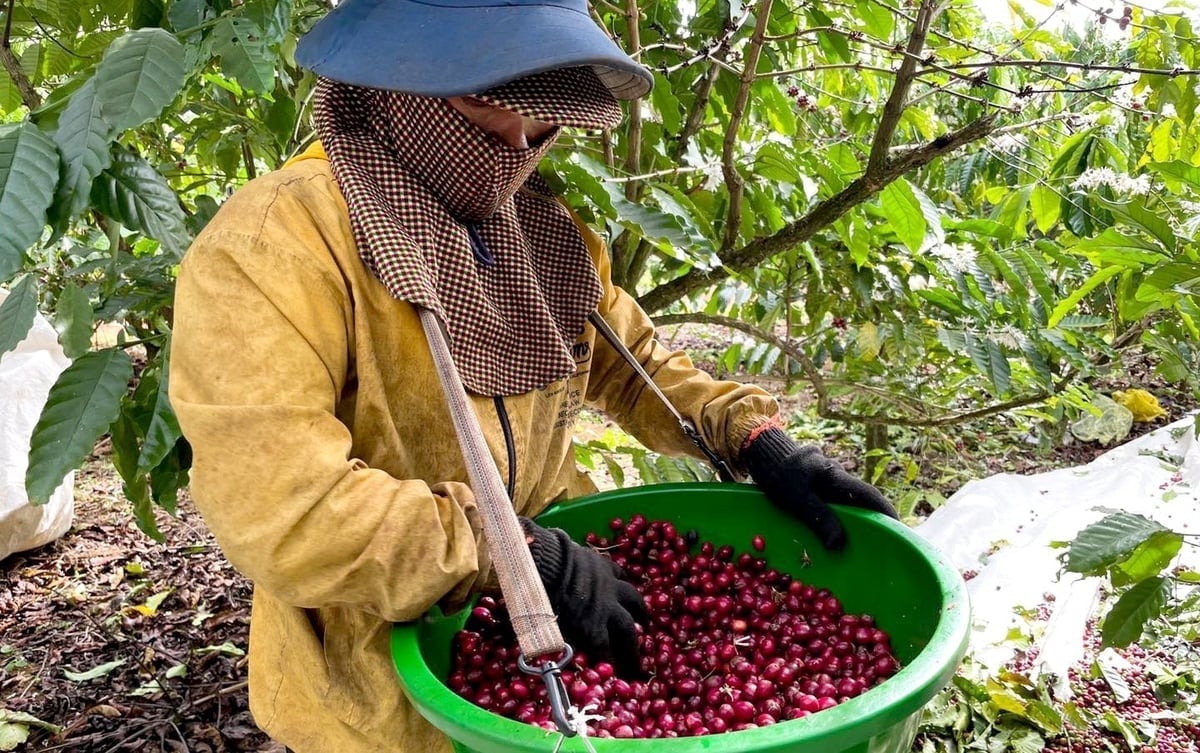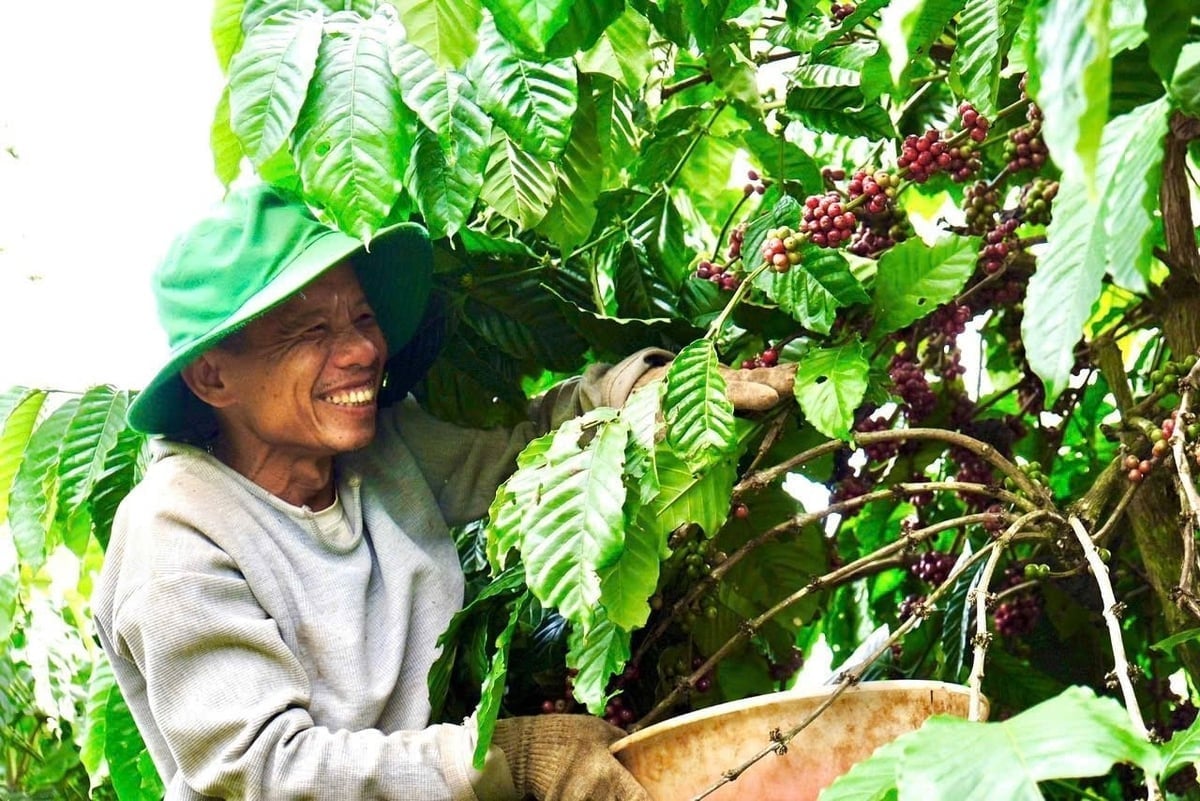November 21, 2025 | 09:00 GMT +7
November 21, 2025 | 09:00 GMT +7
Hotline: 0913.378.918
November 21, 2025 | 09:00 GMT +7
Hotline: 0913.378.918
Vietnam's coffee exports in the first half of 2025 reached nearly USD 5.5 billion, becoming a bright spot in the export picture of agriculture, forestry, and fishery products. In addition to the factor of sharply rising average coffee prices compared to the same period last year, the growth momentum also came from the shift toward developing deeply processed and specialty coffee lines. These are products that bring high added value and more sustainable competitiveness in the international market.

Vietnam's coffee exports surge in the first half of 2025. Photo: Son Trang.
As part of the strategy to elevate Vietnamese coffee, Mr. Phan Minh Thong, Chairman of the Board of Directors of Phuc Sinh Joint Stock Company, said that the company is focusing on developing specialty Arabica coffee from the Northwest region. These high-value products are distinguished by their unique flavor, acidity, sweetness, balance, and cleanliness, all of which are well-rated by international roasters. In addition to Arabica, Phuc Sinh is also developing specialty Robusta lines to reposition the image of Vietnamese Robusta coffee in the global market. "Roasters in the EU, the United States, Ita`11111ly, and other countries have become familiar with and now use Vietnamese Robusta coffee, thanks to significant improvements in quality over the past 10 years", Mr. Thong said.
By developing deeply processed coffee products, Vinh Hiep Co., Ltd. recorded a 48% increase in export turnover in the first half of the year. Most of this growth came from instant coffee and roasted coffee, which are deeply processed products exported to Europe. According to Mr. Thai Nhu Hiep, the company's Director, high coffee prices are a favorable factor, but more importantly, the contribution of high value-added products is significant. For a demanding market like the EU, product quality alone is not enough; businesses must also prove transparency and responsibility in production, aiming for sustainable development.
In fact, the EU market is currently a key export destination for many Vietnamese coffee companies. Data from the General Department of Customs shows that the EU remained Vietnam’s largest coffee consumer market in the first half of the year, accounting for 42.6% of total export turnover, with 409,713 tons exported, worth USD 2.3 billion. This marked an increase of 14.7% in volume and 84.9% in value compared to the same period in 2024.
Vietnam’s top coffee export markets, both overall and within the EU bloc, include Germany (accounting for 15.3%), Italy (7.6%), and Spain (7.5%). Among them, export turnover to Germany increased by 2.1 times, to Italy by 47.4%, and to Spain by 67%.
According to Mr. Tran Ngoc Quan, Commercial Counselor of the Vietnam Trade Office in Belgium and the EU, consumer trends in the EU are shifting strongly toward green, clean, and traceable products. Therefore, businesses aiming to tap into this market must focus on developing differentiated product lines such as high-quality coffee, certified coffee, specialty coffee, and deeply processed coffee. In particular, the EU is applying stricter standards such as the EU Deforestation Regulation (EUDR), which requires a transparent supply chain from farm to cup.

Developing specialty and sustainable coffee helps increase export value. Photo: Tran Tho.
From an industry perspective, Mr. Trinh Duc Minh, Chairman of the Buon Ma Thuot Coffee Association, believes that Vietnam is increasingly integrating into the global market. What is noteworthy is that the internal strength of the coffee industry has changed. Farmers, cooperatives, and businesses are now behaving more professionally in the market. According to Mr. Minh, Vietnam has begun producing specialty coffee lines that sell for 1.5 to 2 times higher than the global average. This proves that the potential to enhance value in the export chain is no longer a distant prospect.
However, according to Mr. Nguyen Nam Hai, Chairman of the Vietnam Coffee and Cocoa Association (Vicofa), experts believe that Vietnam needs a long-term development strategy to maintain and expand its position in the coffee industry. Mr. Hai stated that the industry cannot continue to grow by increasing volume but must shift toward improving quality and value. This requires re-cultivating growing areas toward higher quality, investing in certified production processes, and increasing the proportion of deeply processed products from the current 10% to 25% to 30% in the coming years. At the same time, the industry must quickly adapt to new market regulations, especially the strict environmental and traceability standards from the EU.
Expert Nguyen Quang Binh clearly stated that Vietnam cannot compete with Brazil in terms of volume or low prices. The sustainable path lies in focusing on quality, developing specialty coffee, and building a story behind each product. This could be the identity of the growing region, sustainability in farming, or the cultural uniqueness of Vietnamese phin coffee. These values are exactly the competitive edge that premium markets are looking for.
Translated by Huong Giang

(VAN) A surge in Ukrainian egg exports, largely driven by soaring sales to the UK over the last few years, has notably pushed up egg prices on the domestic market.

(VAN) The price of Arabica Catimor coffee in Quang Tri is currently at VND 25,000–27,000/kg (fresh cherries), the highest level ever recorded

(VAN) 'From the coffee story, we can think deeper and further about the crop production sector - from development orientations and value-chain organization to international integration,' assessed Dr Le Quoc Doanh.
/2025/11/18/2431-0-161627_248.jpg)
(VAN) Viet Nam accounts for 43% of the world's export volume of Robusta coffee. However, the Vietnamese Robusta coffee brand has yet to gain broad recognition on the global market.
/2025/11/18/5617-2-125215_406.jpg)
(VAN) The consumption demand for premium, healthy, and cold-brew tea products is rising globally, including in the Thai market, opening new opportunities for Viet Nam.

(VAN) The 3F+ model aims for selective resource management, regenerative protection, green education and consumption, all intrinsic to Dabaco’s sustainable development strategy.

(VAN) Carefully packed tea bags, neatly arranged inside containers, begin their 5,000-kilometer journey to Afghanistan, carrying with them the aroma of mountain forests and the pride of Lai Chau province.